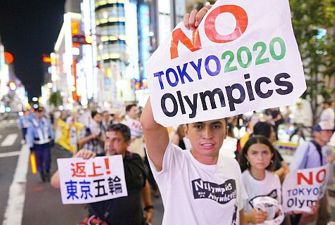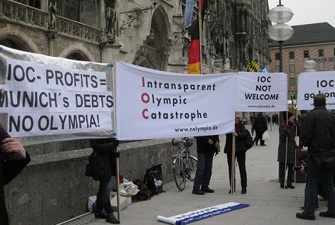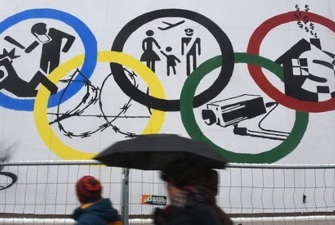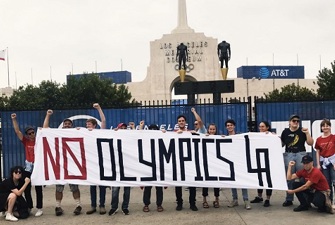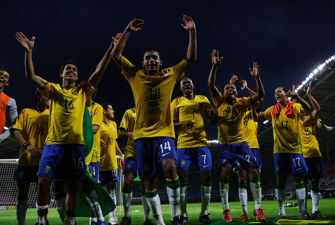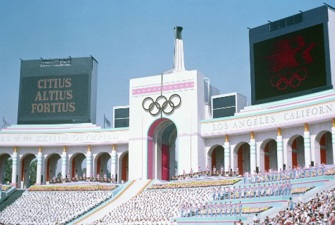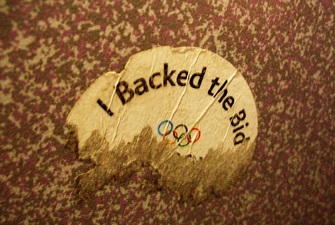A cautious game: Protesting mega-events in Russia
This second article in our series on civic contestation of mega-events looks to Russia and the protests that have played out here in spite of the efforts by authorities to stifle and suppress popular resistance.
Protesting in Russia, especially in recent years, is no simple thing. Broadly speaking, since the protest waves of 2011 – 2013, Russians are now experiencing a process of domestic political closure, with noticeably fewer opportunities to register discontent or to effect change. And yet resistance exists, both online and to a lesser extent in the streets, and took place before, during, and after both the 2014 Winter Olympics and the 2018 Men’s Football World Cup, though much of this was missed outside of Russia.
Generally, when Westerners hear about Russian protest, they tend to think about Alexey Navalny – the anti-corruption politician famous for organizing unsanctioned demonstrations – or Pussy Riot, the feminist anarcho-punk collective that burst into international consciousness in 2012 with their anti-Putin punk prayer in an Orthodox church. But aside from these famous names, protest large and small did take place, despite the efforts of authorities to stifle and suppress.
Combined with a cocktail of belligerent nationalism and worsening international relations, Russia’s growing authoritarianism makes for a peculiar climate in which to host mega-events, and a riskier environment overall for popular resistance as compared to many other hosts. So, what did these acts of resistance look like and what were they about?
This piece presents a short overview of Russian protest in the context of hosting both the Olympics and the World Cup. It covers the actions of the bigger names but also focuses on protest that may be more under the radar for outside observers. Overall, whether agitating against hosting a mega-event, a controversial urban development plan, or something else entirely, conditions for organizing protest have grown worse. High risks and potentially severe consequences have led to a more subdued environment for political activity, though it is important to note that protest and resistance do continue.
Costs and corruption
Financial costs – always a controversial issue when mega-events are involved – were exorbitant for both the 2014 Olympics and the 2018 World Cup. Despite the “feel-good effect” that makes cost matter less in the public consciousness once the games begin, the bloated budgets and blatant giveaways provided substantial fodder for protest.
Though Navalny’s Anti-Corruption Foundation released numerous blogs covering the high costs of the World Cup, it was the finances of the Sochi Olympics that earned most attention. In 2014, the foundation released an exhaustive report, in both Russian and English, detailing the costs and corruption across Sochi’s major Olympic infrastructure projects, implicating shady government officials and well-connected businessmen. This report was also presented as a bilingual website with slick summaries for popular distribution. In this way, Navalny and his organization attempted to bypass government control of the traditional media landscape and use the internet to insert a more critical narrative.
Navalny was not the only dissenting voice to take advantage of the digital realm, as protest hashtags, critical cartoons, and scathing bloggers and vloggers bloomed on social media sites like VK (Russia’s Facebook), Twitter, and YouTube, spawning nationwide internet debates about Olympic corruption. However, perhaps since the construction effort focused only on Sochi, there were few physical protests in other cities, though authorities did shutter a contemporary art exhibit in Perm because it was critical of the Games.
Instead, most debates and dissent took place online and, to various extents, in critical independent media. The physical protests I investigated in Sochi were small affairs, self-organized locally to protest ecological damage to individual communities.
Developments for the World Cup are more dispersed than for the Olympics, since the football championship was hosted in eleven cities instead of only one. As the preparations involved numerous controversial interventions into the urban landscape of the host cities, it seems reasonable to expect nationwide protest. However, due to Russia’s centralized economy, even the large cities that hosted the games are reliant on Moscow for funding. Combined with a governmental culture suffused with personal connections and hampered by entrenched corruption, it is not uncommon to find urban neglect in many areas of Russia’s cities, particularly where foreigners are less likely to visit. Because of this, many host city residents welcomed the World Cup and considered hosting as a means to secure financial support. After all, why not upgrade the airport, the municipal transport system, and important thoroughfares – all by a guaranteed date under contract with prestigious international institutions?
My research in regional cities revealed that issues of corruption and broken budgets were often dismissed as business-as-usual, and only addressed by a minority of politically minded individuals. Indeed, rather than street protests or political agitation, a palpable sense of depoliticized resignation overshadowed World Cup developments, even among those who were opposed to hosting.
Protest beyond mega-events
There are many instances of recent political contestation that are not related to mega-events – indeed, too many to cover here. Many of these protests are distinctly local and do not often make the national – much less international – news. In many respects it is harder to protest mega-event developments, since those projects are marked as a national priority and are accompanied by increased security attention. Conversely, local issues often have more immediate goals and are often less politically volatile. At the same time, these protests sometimes intersect with mega-event hosting and thereby earn greater attention.
Examples of these local protests abound. In St. Petersburg, a highly regarded private university with a liberal reputation came under significant political pressure and had its accreditation revoked. In response, students and alumni gathered for public protest. And in Ekaterinburg, residents held hands around the city’s lake in a symbolic protective embrace, protesting against plans to build a cathedral on the water.
Despite the fact that both of these cities were also preparing to host the World Cup, neither protestors nor authorities engaged with mega-event discourses in order to advance or defend their respective agendas. Instead, these contestations were contained within the city’s independent life and remained separate from hosting. In contrast, a garbage crisis erupted in Sochi after the Olympics, with waste services overwhelmed and mountains of refuse piling up around the city. Residents organized against the municipal administration, sometimes using the city’s status as Olympic host to bolster their argument. “We’re an Olympic capital,” one activist told me. “And Olympic cities should be clean.”
During the preparatory period for the Olympics, Sochi 2014 was also implicated in political controversy. The most significant of these was the federal passage of the so-called “gay propaganda” bill in 2013, restrictive legislation that forbids public discussion of homosexual relationships under the argument of protecting the youth. Due to the increased attention of the upcoming Olympics – and the fact that the Olympic Charter stresses non-discrimination – this measure sparked anti-Putin and anti-Russian protests in the west. In Russia, however, this measure was protested only by a minority, since gay rights are a largely invisible topic outside of Moscow and St Petersburg. The majority of the country supported this legislation and did not understand the international furor.
There were other controversies facing Sochi 2014, including the siting of venues on land that historically had belonged to the Circassians, an ethnic group conquered as the Russian Empire expanded into the Caucasus. Similar to the LGBT law, this issue was more controversial outside of Russia than inside, spurring international media coverage and academic investigation.
Labor rights violations also attracted international attention, but most protest in Sochi was undertaken by locals against developments that directly affected their lives by destroying the immediate environment. I interviewed environmental activists who protested the destruction of endangered plants; they were obliged to meet with an officer from the federal security services every week to report on their activities. Under this pressure, they refrained from street action and only cataloged destruction and published their warnings. Activists who were more strident about protesting the colossal environmental damage were harassed and sometimes arrested, and in some cases, forced to flee the country.
Smaller actions also took place in individual neighborhoods against specific developments. The outcomes of these local protests varied: people successfully organized against a new garbage dump in their Lazarevskoe region neighborhood, but residents of Akhshtyr were unable to stop the illegal quarries dug near their village, and the security services threatened them with immediate arrest if they enacted their plans to barricade the road. These protests were so small that they would hardly be noticed if not for the efforts of residents to document them on local websites. Through the internet and social media, this citizen journalism reached a wider audience, both within the Sochi region, across the country, and even, in some cases, internationally. They did not, however, begin to use Olympic discourse as a protesting strategy until after the games had passed.
During the World Cup, the most notable protests occurred when the federal government decided to raise the retirement age. Cleverly and cynically, authorities announced this measure on the very opening of the World Cup but, despite the Russian national team’s first game victory, protests erupted both online and, notably, in the streets. Protest crossed party and political lines, uniting pro-western liberals with conservative nationalists. Independent polling revealed a dramatic increase in citizen discontent and a strong potential for further protests.
Protest potential has not been this high in nearly a decade and, while this has not translated into political instability, the authorities have reacted; even the Russian president began walking back the rhetoric on retirement reform. So, while these protests were not directly involved with the World Cup, the authorities attempted to use the games to mask a deeply unpopular political maneuver, even criminalizing pension-related protest during the event. Nevertheless, the national agitation continues, even two months after the games ended. Navalny was arrested for organizing a nationwide protest against the reforms, but online dissent continues to flourish and street actions likely will proceed as well.
Conclusions and caution
Government authorities have increasingly clamped down on internet dissent, expanding the powers of Roskomnadzor, the federal communications supervisory and censorship agency. This has led to activists and ordinary citizens alike being fined and sometimes arrested for online activities. Indeed, aside from being used as a tactic to silence political opponents, authorities have targeted regular people for liking or reposting material deemed extremist, obscene, or injurious to the feelings of orthodox believers.
Alongside this, numerous independent blogs and alternative news sites have been closed or coopted, creating an environment of fear and self-censorship. For their part, Pussy Riot activists – who were whipped by Cossacks during a protest performance at the Sochi Olympics – impersonated police officers and invaded the pitch at the World Cup final. They did this not to criticize the World Cup but rather to highlight the Russian government’s human rights abuses, including political harassment for online activity.
Russian law is not conducive to protest. Mass gatherings must be granted permission by the authorities and these approvals are comparatively rare. When protests occur anyway, this allows authorities to detain and imprison organizers, effectively depriving movements of leadership and instilling fear of reprisal in other protesters. Single individuals are allowed to protest without permission if they are separated from other protesters by at least 50 meters. Despite this, individual protesters often are arrested, even if they are in compliance with the law.
The situation has grown stricter due to hosting the Olympics and the World Cup. On top of further legal restrictions that accompanied hosting, both of the events were heralded as national projects and associated with patriotic sentiment. It became difficult to criticize mega-event developments without being seen as criticizing the nation. This is particularly true for many commentators outside of Russia, who too often have engaged in Russophobia rather than a more factual reporting. This allows the Russian government to dismiss external criticism, however legitimate, as inherently anti-Russian.
Similarly, it allows the government to paint internal critics as puppets of hostile foreign powers. With severe consequences for being on the wrong side of the law, Russians who disagree with government policy must tread carefully – hence Sochi residents’ use of Olympic discourse to shield their political engagement. These conditions result in a distinctly muted form of protest: largely individual and often digital, unless – as when developments pollute their very doorstep or threaten their retirement – intolerable circumstances push people into the streets en masse.
